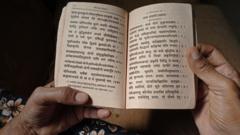The newly scrutinized letter addressed to a "Mrs Shakspaire," which had languished in obscurity since its initial discovery in 1978, has now been re-evaluated with modern technological tools. Initially spotted in the binding of a 1608 book, this correspondence contains what is believed to be a reply from Shakespeare's wife, suggesting a more engaged relationship between the playwright and Anne than previously acknowledged.
Steggle's work involved piecing together connections indicated within the letter and corroborating them with known historical facts, revealing that the traditional portrayal of Shakespeare as detached may not reflect the realities of his marital life. Critics have long adhered to the stereotype of Shakespeare's domesticity being an anchor that he sought to escape; however, evidence from this letter might nuance our understanding of their partnership.
In light of these revelations, Shakespeare's legacy continues to evolve, offering new insights into his personal life and how it interplayed with his artistic endeavors. This evolving narrative may significantly alter the way scholars approach and analyze Shakespeare's body of work and his life choices moving forward.
Steggle's work involved piecing together connections indicated within the letter and corroborating them with known historical facts, revealing that the traditional portrayal of Shakespeare as detached may not reflect the realities of his marital life. Critics have long adhered to the stereotype of Shakespeare's domesticity being an anchor that he sought to escape; however, evidence from this letter might nuance our understanding of their partnership.
In light of these revelations, Shakespeare's legacy continues to evolve, offering new insights into his personal life and how it interplayed with his artistic endeavors. This evolving narrative may significantly alter the way scholars approach and analyze Shakespeare's body of work and his life choices moving forward.













